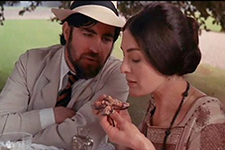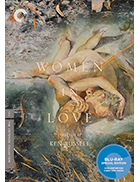Women in Love
|  Ken Russell’s adaptation of D.H. Lawrence’s 1920 novel Women in Love was the film that put the maverick British director on the international map. Its romantically raw depiction of sexuality both fervid and repressed made it one of the breakthrough films of the new permissiveness in the mainstream treatment of what goes on between the sheets (and, in this film, in the forest and in a pond, among other places). Lawrence had literary pedigree, so it is little surprise that filmmakers flocked to adapt his heavy, amorous tomes; Women in Love was one of three major adaptations of his works in the late 1960s, the other two being The Fox (1967) and The Virgin and the Gypsy (1970). Russell, who did a complete, though uncredited, reworking of playwright/novelist Larry Kramer’s script, sticks close to Lawrence’s novel, lifting entire sections of dialogue verbatim, yet the film remains resolutely his. And how could it be otherwise? Although not to everyone’s tastes (including, I must admit, my own), Russell was a singular cinematic artist who went boldly or not at all. Words like excessive and distasteful were the most common adjectives used to describe his films, particularly the impressive run of purplish, gaudy, controversial biopics he churned out in the 1970s, including The Music Lovers (1971), about the Russian composer Peter Ilych Tchaikovsky, which Russell described simply as a film about “a homosexual married to a nymphomaniac”; Savage Messiah (1972), about the French sculptor Henri Gaudier-Brzeska; Mahler (1974), about Austro-Bohemian composer Gustav Mahler; Lisztomania (1975), about Hungarian composer and pianist Franz Liszt; and Valentino (1977), about the Hollywood silent-movie romantic icon Rudolph Valentino. During that period he also directed a horror film—the incendiary The Devils (1971)—and two musicals—The Boy Friend (1971), starring Twiggy, and Tommy (1975), his obnoxious cinematic version of The Who’s great rock opera. Anything that might be viewed as “excessive” in Women in Love—and there were many critics at the time who used that very word—was just a warm-up for what was to come. Set against the backdrop of British high society in the years just after World War II, the story centers around two unlikely couples who spend the first half the film coming together and the second half trying to stay together. The women of the title are two sisters, Gundrun (Glenda Jackson), a calculating and free-spirited painter and despises convention, especially when it comes to romance and marriage, and Ursula (Jennie Linden), a schoolteacher who aspires to Gundrun’s rebellion, but is decidedly more grounded. Gundrun is drawn to Gerald Crich (Oliver Reed), the wealthy, but exceeding glum and violent inheritor of his thoroughly unpleasant father’s coal mining operation, while Ursula becomes involved with Rupert Birkin (Alan Bates), an unmoored intellectual who delights in social provocation. The film’s single greatest scene finds Rupert at a posh outdoor lunch describing in luridly sexual detail how his then-lover Hermione Roddice (Eleanor Bron), a self-centered socialite, should properly eat a fig. There is something wonderfully subversive about the delight Rupert takes in this extended food etiquette-as-double-entendre, and the whole scene has a wicked energy that the rest of the film studiously lacks. It’s not that Russell doesn’t try, but he succeeds mostly in confusion. There is a lot that happens in the film, but there is very little understanding about why any of it happens. There are numerous scenes in which characters expound mightily about themselves and each other, but by the end of the film I didn’t feel like I really knew any of them. There are some great charaterizations, including Vladek Sheybal’s Loerke, a fey German to whom Gundrun takes a liking during a trip to the Swiss Alps mainly to enflame the morbid Gerald’s simmering jealousy. The film wants to work as a series of contrasts, particularly regarding Rupert and Gerald, who are polar opposites and yet great friends. Rupert, with his floppy hair and longish beard, is a high-minded sensualist looking for connection, which he wants with both Ursula and Gerald, while Gerald, with his perfectly cropped moustache and brick-like jawline, is so closed-off that he is incapable of giving anything of himself. There is a strong homoerotic undertone throughout the film, which is not surprising given that Larry Kramer’s fame as a writer derived largely from his depiction of gay lives (he courted immense controversy with his 1978 novel Faggots and went on to become a leader in the fight against AIDS in the 1980s). The idea of repressed gay desire is certainly present in Lawrence’s novel, and it works as both literal sexuality and a spiritual/emotional extension of Rupert’s need for intense human connection with both men and women. While Russell largely fails to make dramatic connections and bring us into the inner world of his characters’ conflicted desires, he succeeds mightily in making a film of often breathtaking beauty that balances the conventions of the British costume drama with his experimental proclivities. Russell had already made a name for himself in the world of British television, having directed numerous biographical documentaries for the BBC that dared to mix fact and fiction and various aesthetic styles. He ported that over to his visualization of Women in Love, although you often sense that he’s trying to fill the film’s emotional voids with superlative visual impact, which can only work for so long. There is little humanity in the film (although quite a bit more than you find in his later efforts), which doesn’t give you much to grab onto dramatically. If you find your interest waning as the film moves on, it is likely due to exhaustion of trying to generate empathy with characters who constantly evade such connection. So much of the film feels written and performed, but rarely lived. Women in Love is replete with memorable moments, including the infamous nude wrestling match between Rupert and Gerald on the floor of a drawing room in front of a blazing fireplace; the tragic discovery of a drowned newlywed couple at the bottom of a pond that has been drained, their naked limbs intertwined in a death’s embrace; and several dream-like evocations of sexual fantasia, the best of which finds Rupert and Ursula running into each other’s arms in a shot tilted on its side, which allows Russell and cinematographer Billy Williams (whose work here was nominated for an Oscar) to emphasize their extended arms and grasping hands. These moments of visual power linger, even if the film’s abrupt end feels almost stridently unsatisfying.
Copyright © 2018 James Kendrick Thoughts? E-mail James Kendrick All images copyright © The Criterion Collection / MGM/UA | |||||||||||||||||||||||||||||||
Overall Rating: 

 (2.5)
(2.5)


